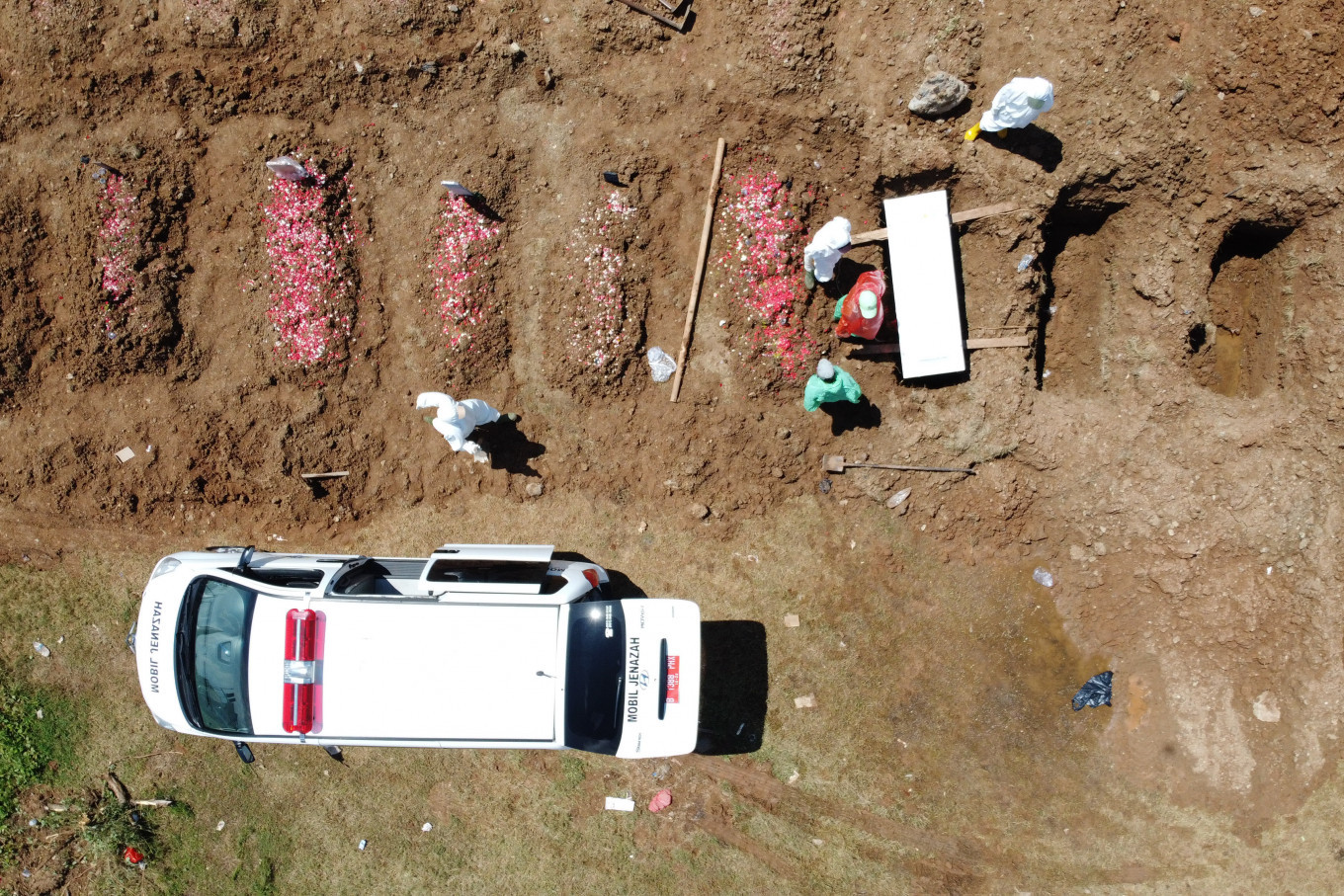Testing backlog forces Jakarta to apply COVID-19 protocol to more than 1,000 burials
Jakarta is enforcing the interment protocol as a precautionary measure in burying the bodies of all suspected cases of COVID-19 infection.
Change Size
 Jakarta Parks and Forestry Agency officials bury the bodies of several people who had died of coronavirus at Tegal Alur Public Cemetery, West Jakarta, on April 7, 2020. (JP/Donny Fernando)
Jakarta Parks and Forestry Agency officials bury the bodies of several people who had died of coronavirus at Tegal Alur Public Cemetery, West Jakarta, on April 7, 2020. (JP/Donny Fernando)
T
he bodies of more than 1,000 people have been buried according to the coronavirus health protocol in Jakarta as laboratories battle a backlog in COVID-19 testing for suspected cases.
As of Friday, 246 patient deaths had been confirmed as COVID-19 cases in the country’s capital, the epicenter of the outbreak in Indonesia. The figure represents almost half of all deaths reported nationwide.
But the Jakarta administration has instructed that the bodies of patients under surveillance (PDP) and persons under monitoring (ODP) be buried according to the established health protocol for burying patients who had died of COVID-19.
The protocol requires both the body of the deceased and their coffin to be wrapped in plastic. Both funeral and cemetery workers must wear personal protective equipment (PPE) including gloves, masks and coveralls when handling the body.
Dharma (not his real name) lost his mother, who was admitted as a PDP for treatment at Persahabatan Central General Hospital in East Jakarta.
The 21-year-old resident of Kampung Melayu, East Jakarta, told The Jakarta Post on Thursday that the cause of his mother's death was recorded simply as "respiratory failure", because the hospital was still waiting for the results of her COVID-19 test from the Health Ministry’s Health Research and Development Agency (Balitbangkes).
"The hospital said that the results will arrive in two to 10 days," said Dharma. "[But] It has already been 10 days counting the weekends, or eight working days."
He said that the hospital had explained the details of the burial procedures for his mother's body.
Dharma's mother was buried on April 9 at Pondok Rangon Public Cemetery in East Jakarta, but he still hoped that the government would release her test results.
Jakarta Governor Anies Baswedan said that the interment protocol for PDPs who had died before their tests results had been issued was a precautionary measure to prevent the virus' transmission. The protocol was being applied in the absence of the test results.
"I just came from Pondok Rangon cemetery," he said on Wednesday. "The number of burials adhering to the protocols for probable COVID-19 deaths has reached 1,000 already."
The administration's website recorded that 1,114 burials have been conducted under the health protocol as of Saturday.
According to the Eijkman Institute for Molecular Biology, which has compiled the Health Ministry's daily log of polymerase chain reaction (PCR) tests performed at designed COVID-19 labs, Indonesia has been testing just 1,000 to 2,000 samples per day over the past two weeks. This is far below President Joko Widodo's target of 10,000 tests per day.
The number of tests increased to above 7,000 on April 12, but three days later on April 15, the daily average had declined to a little over 3,000 tests.
Jakarta recorded on Friday a cumulative total of 2,865 PDPs, of which more than 1,400 patients (48.9 percent) had recovered.
“Our low testing capacity has resulted in unconfirmed [coronavirus] deaths among PDPs, and the central government has yet to recognize the [actual] number of deaths [in Jakarta],” said Iqbal Ridzi Fahdri Elyazar, a researcher at Eijkman's disease surveillance and biostatistics division.
Many problems are behind the delay in test results, including a shortage of the reagents needed for the PCR test. The government said on Wednesday that its current stock of reagents would last only a week.
Another issues is that even after hospitals and local health agencies had received individual test results, they are not allowed to inform the patients' families or the public before the government announces the latest COVID-19 figures.
Read also: In major policy shift, Jokowi orders transparency in pandemic fight
National Disaster Mitigation Agency (BNPB) spokesman Agus Wibowo, who is also on the national COVID-19 rapid response task force, acknowledged that the government had been unable to identify probable coronavirus deaths because of the delay in testing.
"It still takes about five days for the results [...]. Indeed, many people are dying before [their] test results arrive. We need more testing kits,” said Agus.
Meanwhile, national COVID-19 spokesman Achmad Yurianto said he did not want to conclude prematurely that the bodies buried according to coronavirus protocol in Jakarta were related to COVID-19.
"Some time ago, a member of my staff died due to Stage IV cancer. [But] Everyone said it was COVID-19. I'm speaking based on the [available] data on confirmed deaths from the coronavirus," he said. "Not all of the 1,000 [buried in Jakarta] were COVID-19 deaths.”









